- Home
- Bianca Blythe
The Perfect Fiancé (Matchmaking for Wallflowers Book 0) Page 2
The Perfect Fiancé (Matchmaking for Wallflowers Book 0) Read online
Page 2
“Would it help?” Rosamund softened her voice. She’d found that when a man was in the midst of proposing, he tended toward a greater display of emotion than was his habit.
“I was about to speak about our eternal happiness.” If the man had attempted to hide his petulance, he’d failed to do so well.
Rosamund smiled. “Perhaps I shouldn’t have stopped you.”
After all, she did appreciate when people praised her. Not that they reached for comparisons with the heavens and the hillsides when they described her features, their creativity only hampered by the nature at hand. Such rapturous praise was reserved for other women. Women they didn’t actually contemplate marrying. Women they would have been too intimidated by to propose to on a whim.
Something about Rosamund’s sensible expression reassured even the timidest men. Her warm brown eyes and mousy hair, features that wouldn’t be out of place on a maid, appealed to them. The unfashionable breadth of her hips was seen as a childbearing advantage, and it didn’t matter that her skin tended to freckle and tan at a rate associated with Americans.
Men in Yorkshire didn’t travel to London. And if they did, they wouldn’t take their wives. She would be home with the children, and if they were so inclined, they might explore London’s nighttime offerings on their own, indulging in vices as their wives tended to the hearths at home.
So Rosamund often got proposals, and though on occasion she’d pondered whether she should take any of the men up on their hasty offers, she’d read enough books to wonder whether there might be something else in this world.
“So we can marry?” Dunbar beamed and lowered his knee firmly to the ground. He rustled in his purse. “For the children are not really as horrid as the neighbors claim. Really quite tolerable.”
“I’m certain they’re charming,” she murmured.
“It’s a yes?”
She shook her head, and his shoulders slumped a fraction. Perhaps they would reach further downward if he and Rosamund had had the pleasure of exchanging words on another occasion as well.
She really did need to have her own season. The offerings in the county were slim, a fact not helped when most of the men of marriageable age had tromped over to France.
There was only one intriguing man here, and she’d reserved him for her older sister, Fiona. Not that she’d told either of them yet. Her lips turned up at the thought, before Dunbar cast her a reproachful glance, and she straightened her lips into something she hoped appeared more respectful.
“Er—” Dunbar’s Adam’s apple moved downward. Apparently the man was less accustomed to proposing to women than Rosamund was used to being proposed to.
“Please do rise, Mr. Dunbar.” She gentled her tone.
Heavy footsteps pounded in the corridor. The door swung open, and the crystal handle slammed against the wall, rattling the vases that perched on the sideboards.
Dunbar scrambled from Grandmother’s red oriental carpet, and his face transformed into a puce color better suited to textiles than skin.
“You’re alone! Unchaperoned!” Fiona rushed in, and her gray skirts swished against the furniture. Her auburn hair was invariably untamed, and this moment was no exception.
“I was,” Rosamund said.
Dunbar brushed his hands against the creases of his rather unfashionable breeches.
“Goodness!” Fiona hastened to the sofa and settled into it. She directed her gaze to him and pursed her lips with an expertise befitting an oft-irritated governess.
“It’s fine. Mr. Dunbar did not compromise me.” Rosamund retained a matter-of-fact tone. Dunbar’s eyes shifted, as if contemplating claiming a moment of passion had occurred, so she would be beholden to him for the rest of her life. She firmed her gaze. “Isn’t that correct?”
“Er—yes,” Dunbar said finally, regaining some grasp of ethics.
Men had a habit of proposing to her, and Fiona had a habit of entering the drawing room late after a guest was called. Fiona seemed to find something in her own room fascinating, but clearly Rosamund’s status as sole sibling and sole friend was not quite enough to warrant her older sister’s confidence, nor to explain the mud that appeared on her clothes with startling frequency.
“Anyway,” Rosamund said. “I am afraid I cannot marry without my sister marrying first.”
“Oh—I see.” Dunbar tilted his head to Fiona, as if pondering whether he should dive forward in her direction, ring still clutched in hand.
Rosamund cleared her throat before the man could get any ideas. Fiona might have abandoned her season, confining herself, and by extension her sister, to their estate in Yorkshire, but that did not mean that she should leap to marry someone who had intended to marry another a mere three minutes previous.
Not that Dunbar was completely devoid of merit. He might tend toward awkwardness, but she shouldn’t fault him for that. He was good and kind and had made his late wife a satisfactory husband.
“I suppose I should return if your sister does see fit—”
Rosamund smiled. “How gracious. But I would not have you wait for me. Not when you are determined to give your three precious daughters a mother.” She smoothed the folds of her dress. “You might consider calling on Miss Mabel Hedley. You might find it of interest that Miss Hedley has no other sisters. And five brothers.”
“Right.” Dunbar straightened, and his eyes gleamed with a determination she was sure was rare for him. “That is most interesting news. Most—er—timely.”
Rosamund offered him an understanding smile. “I feel certain that you meant to see her all along.”
Certainly Rosamund had noticed the frequency of Miss Hedley’s glances toward Mr. Dunbar in the village church.
The man took his leave, and the door slammed behind him as he made a hasty exit.
Fiona frowned. “You take far too much pleasure in that. I wish you would stop using me as an excuse for why you haven’t married.”
“The good prospects know better than to propose to me.”
“Mm . . . hmm.”
“It’s true. And you should marry. Or at least become engaged.”
“Nonsense,” Fiona said without hesitation, her speed perhaps honed with the frequency with which she’d given the answer.
“You’ll change your mind,” Rosamund said.
“You’ve been reading too many novels.”
Rosamund grinned and leaned forward. “Have you read the one about the highwayman yet? I adored it.”
“I prefer to occupy myself otherwise.”
“Perhaps you might prefer something more intellectual.” Rosamund scrambled for the pamphlet she’d picked up in Harrogate.
She’d been searching for a moment to pass this information on to her older sister. This might not be ideal, but Fiona would benefit from a more strategic approach to finding a match.
Rosamund decided to interpret the narrowing of Fiona’s eyes as interest and slid the paper over to her. The pamphlet was rather more creased than she’d cared to admit, the edges rather worn. She’d hidden the pamphlet in many books, all the better to be able to master the concepts.
Fiona pursed her lips together, as if Rosamund had given her a personal love letter from a certain crazed Corsican.
Rosamund attempted an innocent shrug, and Fiona returned her glance to the pamphlet, Matchmaking for Wallflowers.
“This is manipulative,” Fiona stammered, leafing through the pages of rules and lists of most eligible matches. “I’m sure no marriage could be the least bit happy that had been preceded by such a determined hunt.”
Rosamund sighed. She’d worried her sister wouldn’t understand. “You would find it appealing if the Romans had written it down.”
“Worth studying, perhaps. Not worth following.” Fiona scrunched the pamphlet.
Rosamund leaped forward to rescue the pages and smoothed down the creases. “You need to read them again. They work. And there’s even a list of promising candidates in the back. The Worthings,
for instance. In fact, your childhood friend is visiting Uncle Seymour and Aunt Lavinia.”
“So Aunt Lavinia said.”
Rosamund clapped her hands together. “Isn’t it most exciting?”
“Well, I suppose it might be nice to see Marcus again…”
Rosamund beamed and returned the pages to Fiona. “Babies owe their lives to these rules.”
Fiona sighed and stuffed the pamphlet within a book. “Rosamund. Just how many matches have you made?”
“Six. And I’m only beginning.”
“And you think I should get married?”
“I only desire your happiness.” Rosamund shrugged and strode to her writing table. She settled into the chair from which Dunbar had interrupted her and brushed her fingers against a glossy invitation. “We both know what will happen once Grandmother dies.”
Fiona’s smile wobbled, but she raised her chin. “I’m the picture of happiness.”
“And now you must excuse yourself?”
“Yes,” Fiona said simply.
“Perhaps we might call on Aunt Lavinia tomorrow,” Rosamund said hopefully.
Fiona gave her a tight smile. “Perhaps.”
Rosamund nodded. Uncle Seymour and Aunt Lavinia often bemoaned Fiona’s negative qualities, possessing no qualms in doing so often, and no desire to confine their criticism to private moments.
She would rectify her sister’s loneliness. If Fiona insisted on locking herself away, Rosamund would find a husband for her in Yorkshire. There was no better man than Marcus Worthing, sixth Earl of Somerville, to entice Fiona with. Lord Somerville and her sister needed to fall in love at Cloudbridge Castle, and she would find an excuse to draw him here.
Once Fiona and Somerville married, her sister would be happy again, and everything would be wonderful.
After all, the man was perfect—tall, dark and handsome, conforming to every stereotype of a young aristocrat, but with a demeanor so charming one would never fault him for it. Soon he’d realize her sister’s perfection, and Rosamund would be free to seek her own happiness, her own happy ending, her own earl.
Chapter Three
The sun had evidently exhausted itself after its atypical showing the day before. Dark clouds had retaken their customary positions and were hurtling raindrops from the heavens in full force. Marcus had not ventured further than the library and was once again toiling away.
At least he was in theory. Weighty leather tomes adorned with foreboding gold letters were piled on the nearby table, and he was certain he bore an expression of the utmost concentration on his face, the kind which intimidated most people.
Sir Seymour was not most people. The baronet was extrapolating about his wife’s plans to redecorate Cloudbridge Castle after he inherited. Apparently it would be sublime, and Marcus would need to visit.
“I should reside there now,” Sir Seymour mused. “But my mother is still alive and is taking care of my two nieces. I haven’t the heart to force them out.”
“Indeed?” Marcus pulled his gaze from an article.
“My one weakness is my generosity.” Sir Seymour’s voice boomed and echoed through the ancient rafters above.
Marcus’s lips twitched. He rather suspected his host’s reluctance to turn out his mother and nieces stemmed from an awareness that it would result in the neighboring gentry’s condemnation.
A hesitant cough interrupted his renewed musing on zoology. Quinn, Sir Seymour’s butler, hovered over them. “There’s a young lady asking to see you, my lord. She’s in the drawing room.”
“A young lady?” Sir Seymour scraped his chair against the wooden floor, and Marcus jerked his head in the baronet’s direction. The baronet puffed out his chest and rose from his seat. “Well, well.”
“My lord…” Quinn widened his eyes and his lower lip dropped down, before hastily resuming his customary expression of bland indifference.
Well, almost resuming the expression. Quinn shifted his legs. The man seemed naturally prone to shyness, a fact not alleviated by the bombastic personality of his employer.
“Now listen here, Quinn. I hope you’ve kept this all hush, hush.” The baronet poked his head in the mirror and straightened his wig.
Quinn’s eyebrows darted up.
Sir Seymour lowered his voice to a whisper Marcus hadn’t been aware he’d possessed. “Wouldn’t want the young lady to happen upon my dear wife. Wouldn’t work at all.”
Quinn’s face paled. “I’m afraid—”
Sir Seymour swung his gaze toward Marcus. “Pay attention, young man. Juggling is a feat every man must learn. One day you’ll be married too.”
Usually Marcus would have retorted that he had no desire to see such a state befall him.
Usually he might profess some gratitude that he had a few more years of freedom before he’d take the marital plunge all titled men must make.
Usually he might have chuckled at the baronet’s comment, though he’d never seen the need to take on multiple women.
But instead an image of bronze hair and sun-kissed skin flooded his mind, tangling with the sensation of a soft muslin gown. He mused over dark eyes that sparkled and wide lips not afraid to berate him.
“Her ladyship is speaking with her now.”
Sir Seymour’s mouth gaped, and he seemed to struggle to close it. “By Hades, tell them I’m not here! And that I don’t know that chit! Tell them she must be mad. And—and—”
A pained expression descended upon the butler, and the man interrupted Sir Seymour’s stutters. “The young lady is here to see Lord Somerville.”
Sir Seymour blinked.
“She asked for him expressly,” Quinn continued, his voice gathering force in the absence of any response from the baronet except shock.
Marcus rose.
“Right. Right,” Sir Seymour said finally, rubbing his hand through his hair. “That’s much better. I mean—what young lady could there be to see me?”
Quinn offered him a tight smile, evidently interpreting Sir Seymour’s question as rhetorical.
Sir Seymour emitted a painful laugh and slurped down the rest of his brandy, averting his eyes from either Quinn or Marcus.
Marcus strode toward the door.
“Righty-ho,” his host said meekly. “Enjoy.”
Marcus lowered his torso into a slight bow, striving to retain a placid expression on his face even as his heart rate quickened.
Miss Rosamund Amberly.
It might be her! He hoped it was her.
Though he considered himself less prone to anxieties over attire than the dandies in his set, he did allow himself a cursory glance of his reflection in one of the gilded mirrors that lined the baronet’s corridors before following Quinn into the drawing room.
His dark hair curled, its unfashionable length attributed to his habit of spending more time in his library than under the watch of hairdressers. His cravat was rumpled, and he smoothed the ivory knot. He wished he’d chosen another claw hammer coat, since this one struggled to contain the broad width of his shoulders.
A pleasant alto voice resonated from the drawing room, and he turned toward the sound.
*
Goodness, the man was perfect.
His lips broadened, and she found herself beaming back. His appearance resembled more that of a professor than one of the foppish men in her Matchmaking for Wallflowers pamphlet, and she was reminded that he was lauded as one of England’s greatest rising scientists.
Lord Somerville strolled into the room and his Hessians clicked against the polished wooden floor. Rosamund observed the instant his dark eyes fell on her and the manner in which his pupils flared. Her stomach tightened as if his very gaze were capable of pulling and twisting every organ in her body.
“It’s you,” he murmured, and his rich, baritone voice seemed to cause all her nerve endings to tingle, as if they were arching closer to him.
She shook her head. Such things were impossible. Rosamund knew enough about science to
appreciate that. Her governess had managed to teach her some knowledge that extended past the studies of poetry and art which she’d preferred.
Attraction was an emotion invented by poets and playwrights. All of Rosamund’s suitors had happily married other women, exchanging her easily for other, equally appropriate women at her encouragement.
Matchmaking was about suitability. Her parents hadn’t had a love match. They’d married at the urging of their relatives. And yet no one could doubt their happiness. Practicality had been essential to their romance.
Rosamund was here for Fiona. She mustn’t forget that.
No matter what sort of handsome men with chiseled features and roguish grins wandered around the forest. No matter how heroic they acted. No matter how much they resembled the heroes in Rosamund’s favorite books.
“You remember her!” Aunt Lavinia clapped her hands. “His lordship’s wisdom is renowned throughout Great Britain.”
The earl blinked.
“My niece looked quite different as a child,” Aunt Lavinia continued. “Rather smaller. But of course a man with your intelligence—”
Somerville’s lips swung up, but he kept his gaze on her. “I remember.”
Rosamund reached for her teacup, hoping that the strange fluttering that raced through her body was not visible to him.
“I remember saving you,” he continued, his voice still melodic, the deep sounds still tugging at her heart.
“Is that what you called it?” Her lips twitched at the man’s behavior yesterday. No way would Uncle Seymour’s bullets have reached her.
He shook his head solemnly.
“Oh I remember,” Aunt Lavinia laughed.
Rosamund swiveled her head toward her aunt. Surely Somerville wouldn’t have told Aunt Lavinia about his outrageous, if heroically inspired, behavior.
“Don’t you remember?” Aunt Lavinia laughed. “You were about four and had followed your sister into the creek, even though you didn’t know how to swim. Somerville dragged you out and carried you home.”

 The Earl's Christmas Consultant
The Earl's Christmas Consultant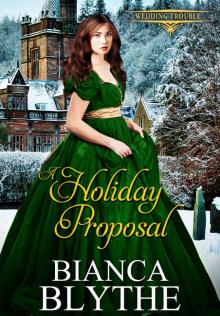 A Holiday Proposal (Wedding Trouble Book 6)
A Holiday Proposal (Wedding Trouble Book 6) The Earl's Christmas Consultant (Wedding Trouble Book 3)
The Earl's Christmas Consultant (Wedding Trouble Book 3)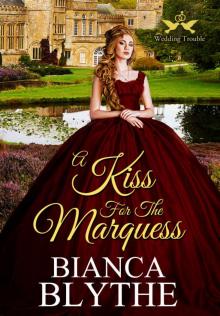 A Kiss for the Marquess (Wedding Trouble Book 5)
A Kiss for the Marquess (Wedding Trouble Book 5)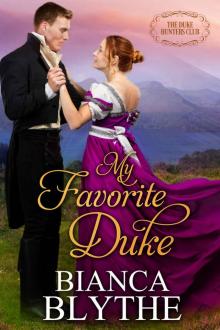 My Favorite Duke (The Duke Hunters Club Book 2)
My Favorite Duke (The Duke Hunters Club Book 2)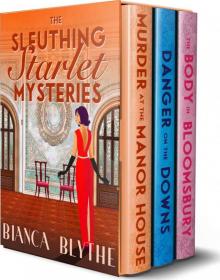 The Sleuthing Starlet Mysteries
The Sleuthing Starlet Mysteries Lords, Snow and Mistletoe
Lords, Snow and Mistletoe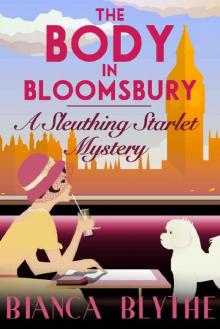 The Body in Bloomsbury
The Body in Bloomsbury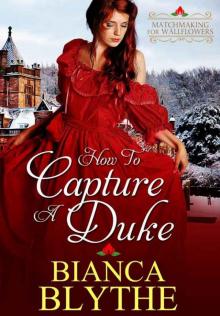 How to Capture a Duke (Matchmaking for Wallflowers Book 1)
How to Capture a Duke (Matchmaking for Wallflowers Book 1)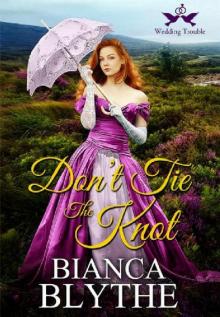 Don't Tie the Knot
Don't Tie the Knot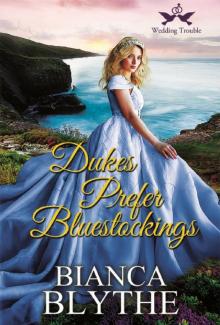 Dukes Prefer Bluestockings
Dukes Prefer Bluestockings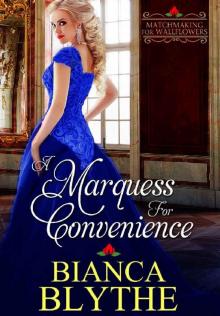 A Marquess for Convenience (Matchmaking for Wallflowers Book 5)
A Marquess for Convenience (Matchmaking for Wallflowers Book 5) Lords, Snow and Mistletoe: A Regency Christmas Collection
Lords, Snow and Mistletoe: A Regency Christmas Collection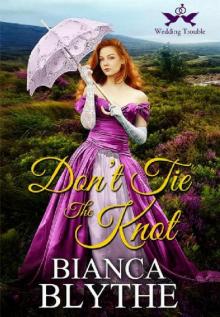 Don't Tie the Knot (Wedding Trouble Book 1)
Don't Tie the Knot (Wedding Trouble Book 1)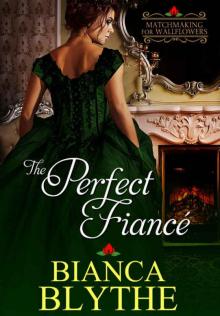 The Perfect Fiancé (Matchmaking for Wallflowers Book 0)
The Perfect Fiancé (Matchmaking for Wallflowers Book 0)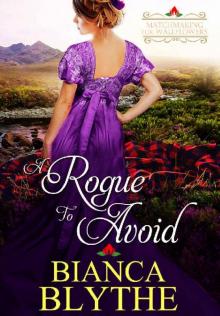 A Rogue to Avoid (Matchmaking for Wallflowers Book 2)
A Rogue to Avoid (Matchmaking for Wallflowers Book 2)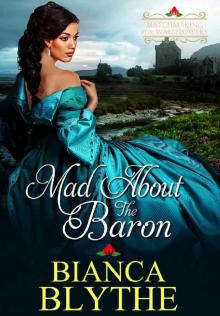 Mad About The Baron (Matchmaking for Wallflowers Book 4)
Mad About The Baron (Matchmaking for Wallflowers Book 4)